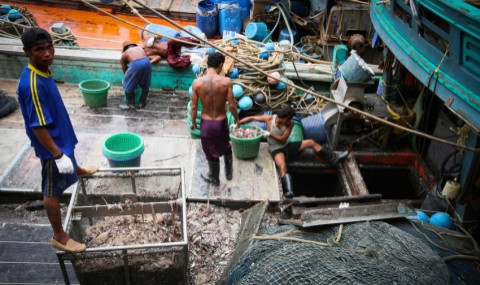Is Thailand Using Burmese Slave Labor On Its Boats? A New Report Says Yes
Burmese migrant workers are used as slave labor aboard Thai fishing boats, according to an investigation by a British nongovernmental organization.
The report, “Sold to the Sea: Human Trafficking in Thailand’s Fishing Industry,” was released Wednesday by the Environmental Justice Foundation, a UK-based nonprofit organization that works internationally to protect the environment and defend human rights. The foundation's report documents 15 Burmese workers who were allegedly beaten and abused by a Thai fishing crew, who forced them to work more than 20 hours per day for little or no money.
Fishing is a multibillion dollar industry in Thailand.
“I saw others beaten with different instruments, with things like a wooden rod or things like that,” an unnamed worker told the foundation in a video paired with the report. “The senior crew attacked workers with knives. And some got killed and their bodies were thrown into the sea.”

A recent United Nations study found that 59 percent of surveyed migrants who had been trafficked onto Thai fishing boats had witnessed a fellow worker being murdered by the boat’s captain or senior crew, the foundation said. Many poor migrants from Myanmar and other surrounding areas rely on human traffickers to skirt Thailand’s complicated and expensive visa and immigration policies.
Now, the Environmental Justice Foundation is calling on the U.S. to downgrade Thailand in the state department’s annual Trafficking in Persons report, which grades countries on a three-tiered scale by the intensity of human trafficking.
“EJF has uncovered a huge number of pirate fishing operators and criminal businesses actively using forced and trafficked workers on their boats as a way to maximise their profits," Steve Trent, the foundation's executive director, said in a statement. "There are no excuses for this modern day slavery and governments and business must come together to stamp it out."
The report, due out next month, has ranked Thailand on the second-tier watch list for three consecutive years.
"We were shocked by the extreme levels of violence inflicted on and witnessed by migrant men held as captive workers on these boats,” said Trent. “This is not an isolated case, but indicative of the widespread acceptance and use of modern slavery in an industry that feeds a global appetite for seafood."
Spokespeople for both the Washington, D.C.-based Thai embassy and the U.S. state department didn't immediately respond to requests from International Business Times for comment.
© Copyright IBTimes 2025. All rights reserved.






















